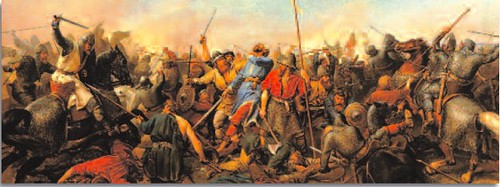The Mozambican War of Independence against Portugal begins.

The Mozambican War of Independence was an armed conflict between the guerrilla forces of the Mozambique Liberation Front or FRELIMO, and Portugal. The war officially started on September 25, 1964, and ended with a ceasefire on September 8, 1974, resulting in a negotiated independence in 1975.
Portugal’s wars against independence guerrilla fighters in its 400-year-old African territories began in 1961 with Angola. In Mozambique, the conflict erupted in 1964 as a result of unrest and frustration amongst many indigenous Mozambican populations, who perceived foreign rule to be a form of exploitation and mistreatment, which served only to further Portuguese economic interests in the region. Many Mozambicans also resented Portugal’s policies towards indigenous people, which resulted in discrimination, traditional lifestyle turning difficult for many Africans, and limited access to Portuguese-style education and skilled employment.
As successful self-determination movements spread throughout Africa after World War II, many Mozambicans became progressively nationalistic in outlook, and increasingly frustrated by the nation’s continued subservience to foreign rule. For the other side, many enculturated indigenous Africans who were fully integrated into the Portugal-ruled social organization of Portuguese Mozambique, in particular those from the urban centres, reacted to the independentist claims with a mixture of discomfort and suspicion. The ethnic Portuguese of the territory, which included most of the ruling authorities, responded with increased military presence and fast-paced development projects.
A mass exile of Mozambique’s political intelligentsia to neighbouring countries provided havens from which radical Mozambicans could plan actions and foment political unrest in their homeland. The formation of the Mozambican guerrilla organisation FRELIMO and the support of the Soviet Union, China, Cuba, Yugoslavia, Bulgaria, Tanzania, Zambia, Egypt, Algeria and Gaddafi regime in Libya through arms and advisers, led to the outbreak of violence that was to last over a decade.
From a military standpoint, the Portuguese regular army held the upper hand during the conflict against the independentist guerrilla forces. Nonetheless, Mozambique succeeded in achieving independence on June 25, 1975, after a civil resistance movement known as the Carnation Revolution backed by portions of the military in Portugal overthrow the military dictatorship sponsored by US, thus ending 470 years of Portuguese colonial rule in the East African region. According to historians of the Revolution, the military coup in Portugal was in part fuelled by protests concerning the conduct of Portuguese troops in their treatment of some local Mozambican populace. The role of the growing communist influence over the group of Portuguese military insurgents who led the Lisbon’s military coup, and, on the other hand, the pressure of the international community over the direction of the Portuguese Colonial War in general, were main causes for the final outcome.


